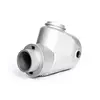Mobile:+86-311-808-126-83
Email:info@ydcastings.com
English
stainless steel casting molds
Exploring Stainless Steel Casting Molds A Comprehensive Overview
Stainless steel casting molds play a crucial role in the manufacturing process, particularly in industries that demand precision, durability, and resistance to corrosion and high temperatures. These molds are essential for creating a wide variety of products across different sectors, including automotive, aerospace, marine, and medical fields. Understanding the intricacies of stainless steel casting molds, their benefits, and their applications can provide key insights for manufacturers and engineers alike.
What Are Stainless Steel Casting Molds?
Casting molds are tools used to shape molten metal into a desired form. Stainless steel molds, in particular, are made from alloys containing iron, chromium, and nickel, which provide them with unique properties. Due to these inherent characteristics, stainless steel molds can withstand high thermal loads, resist oxidation, and maintain structural integrity under pressure.
The manufacturing process of stainless steel molds typically involves the creation of a master model, often crafted from materials that can withstand the casting process. This model is then encased in a refractory material to create a shell mold. Once the shell is ready, molten stainless steel is poured into the mold cavity, allowed to cool, and finally removed to reveal the finished cast product.
Advantages of Stainless Steel Casting Molds
1. Durability Stainless steel molds demonstrate exceptional resilience even under adverse conditions. They can endure repeated use and extreme temperatures, making them ideal for high-volume production environments.
2. Corrosion Resistance The chromium content in stainless steel provides a protective layer of oxide, preventing rust and corrosion. This attribute is particularly beneficial in applications where molds are exposed to harsh chemicals or moist conditions.
3. Precision and Accuracy Stainless steel is known for its ability to retain shape and dimensions even after repeated heating and cooling cycles. This feature ensures that cast parts maintain high levels of precision, crucial for industries where tolerances are tight.
4. Thermal Conductivity Stainless steel conducts heat effectively, which aids in even cooling and reduces the chances of defects like warping or cracking in the final product.
stainless steel casting molds

5. Versatility Stainless steel molds can be designed to produce a wide range of components, from complex geometries to simple shapes. This versatility makes them suitable for diverse industrial applications.
Applications of Stainless Steel Casting Molds
Stainless steel casting molds are utilized in various industries, each leveraging their unique benefits
- Automotive Industry In automotive manufacturing, precision parts such as engine components, transmission housings, and brackets are often produced using stainless steel molds. The strength and corrosion resistance of stainless steel contribute to the longevity and reliability of automotive parts.
- Aerospace Sector The aerospace industry demands materials that can withstand extreme conditions. Stainless steel molds are used to produce critical parts such as turbine blades, structural components, and fittings that require high performance and safety standards.
- Marine Applications Given the harsh marine environment, stainless steel molds are ideal for creating components for boats, ships, and offshore platforms. Their resistance to saltwater corrosion ensures long-lasting performance.
- Medical Field In medical device manufacturing, precision and hygiene are paramount. Stainless steel molds are used to create surgical instruments, implants, and other critical components, thanks to their ease of sterilization and durability.
Conclusion
As industries continue to evolve and demand higher standards of quality and performance, stainless steel casting molds have become an indispensable element in the manufacturing landscape. Their unique properties—durability, corrosion resistance, precision, and versatility—make them suitable for a broad range of applications. For manufacturers looking to invest in reliable and efficient production tools, stainless steel casting molds offer an optimal solution, ensuring that they remain competitive in the global market. Whether in automotive, aerospace, marine, or medical sectors, the utilization of stainless steel casting molds will continue to shape the future of manufacturing.
-
Materials Used in Manufacturing Cap End Pipe FittingsNewsNov.24,2025
-
Material Properties of CF8M CastingNewsNov.24,2025
-
How to Inspect Pump Cap Ends for DamageNewsNov.21,2025
-
Backward Curved Impeller – Efficient Airflow Solutions for Industry | YD CastingsNewsNov.21,2025
-
Automobile Water Pump - Efficient, Quiet, Durable & ElectricNewsNov.21,2025
-
Impeller for Pumps – High-Efficiency, Durable, OEM-ReadyNewsNov.21,2025











